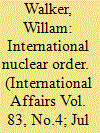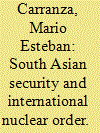| Srl | Item |
| 1 |
ID:
077687


|
|
|
|
|
| Publication |
2007.
|
| Summary/Abstract |
William Walker's article, 'Nuclear enlightenment and counter-enlightenment', raises fundamental questions about the history of efforts to construct order in international politics in relation to nuclear arms and weapons-related capabilities. However, Walker's 'enlightenment' and 'counter-enlightenment' tropes are clumsy and unsatisfactory tools for analysing contemporary policies concerning nuclear deterrence, non-proliferation and disarmament. Walker holds that in the 1960s and 1970s most of the governments of the world came together in pursuit of 'a grand enlightenment project'. This thesis cannot withstand empirical scrutiny with regard to its three main themes-a supposed US-Soviet consensus on doctrines of stabilizing nuclear deterrence through mutual vulnerability, a notion that the NPT derived from 'concerted efforts to construct an international nuclear order meriting that title', and the view that the NPT embodied a commitment to achieve nuclear disarmament. Walker's criticisms of US nuclear policies since the late 1990s are in several cases overstated or ill-founded. Walker also exaggerates the potential influence of the United States over the policies of other countries. It is partly for this reason that the challenges at hand-both analytical and practical-are more complicated and dif cult than his article implies. His work nonetheless has the great merit of raising fundamental questions about international political order.
|
|
|
|
|
|
|
|
|
|
|
|
|
|
|
|
| 2 |
ID:
078557


|
|
|
|
|
| Publication |
2007.
|
| Summary/Abstract |
The article'Nuclear enlightenment and counter-enlightenment by William Walker opened the special issue of International Affairs which was published in May 2007. In it, he claimed that the United States departed in the late 1990s and early 2000s, at the height of its hegemonic influence, from a conception of international nuclear order that it had held to, with few interruptions, over several decades. By so doing, it contributed substantially to the order's currently perceived demise. In responding to criticisms from other participants in the special issue, William Walker defends his arguments while acknowledging the enlightenment trope's fragility; reemphasizes the essential contractual nature of the Nuclear Non-Proliferation Treaty (NPT) which some critics denied; stresses the order's reliance on a judicious balancing (which has temporarily been lost) of realist and constitutional strategies; rejects assertions that the NPT is not a disarmament treaty; argues that the'muddling through'advocated by some authors cannot suffice; and offers reasons why the despondency of several among them may have been overplayed, and why a new phase of consolidation of order might (just might) lie ahead, not least because of the reconsideration of US international strategies that has begun and the widely perceived urgency of preventing further proliferation and avoiding a resumption of arms racing.
|
|
|
|
|
|
|
|
|
|
|
|
|
|
|
|
| 3 |
ID:
094673


|
|
|
|
|
| Publication |
Surrey, Ashgate, 2009.
|
| Description |
xiv, 198p.
|
| Standard Number |
9780754675419
|
|
|
|
|
|
|
|
|
|
|
|
Copies: C:1/I:0,R:0,Q:0
Circulation
| Accession# | Call# | Current Location | Status | Policy | Location |
| 054860 | 327.17470954/CAR 054860 | Main | On Shelf | General | |
|
|
|
|
| 4 |
ID:
077679


|
|
|
|
|
| Publication |
2007.
|
| Summary/Abstract |
William Walker is right to link the international nuclear order to the international political order, and to assert that the attempt to construct a rational nuclear international order around the Nuclear Non-proliferation Treaty is in a shambles. But he puts too much of the blame on the Bush administration (which he is right to criticize) and tends to neglect the fl awed character of the project itself (and the recent changes in the political international order which have an inevitable bearing on the nuclear one).
|
|
|
|
|
|
|
|
|
|
|
|
|
|
|
|